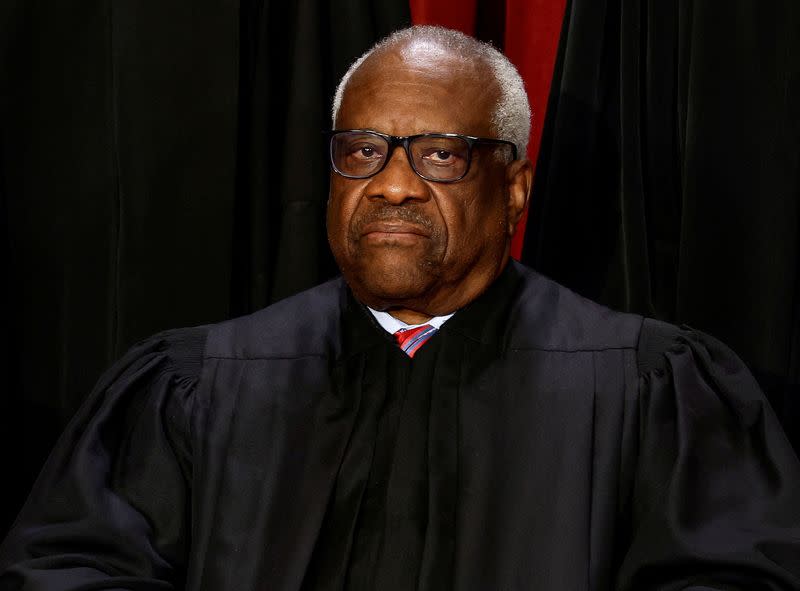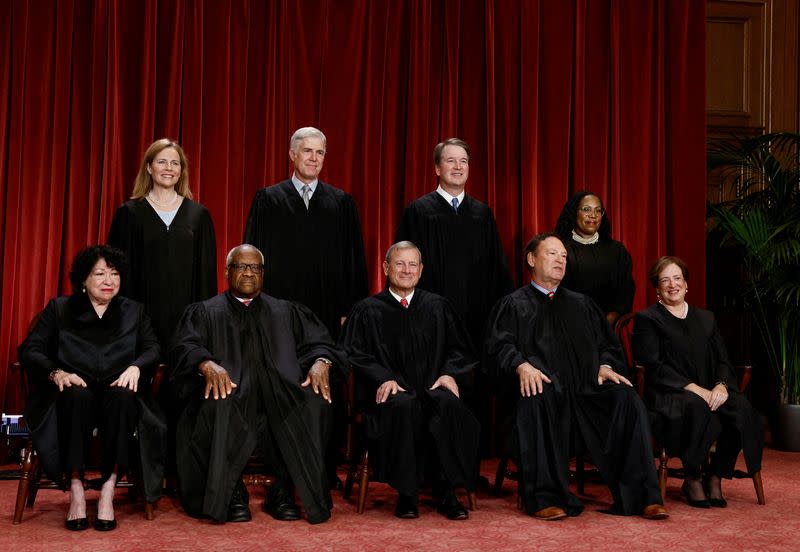US Supreme Court's Clarence Thomas delays filing annual financial disclosure
By Andrew Chung and John Kruzel
WASHINGTON (Reuters) -Conservative U.S. Supreme Court Justice Clarence Thomas, under scrutiny following revelations that he did not disclose luxury trips paid for by a billionaire Dallas businessman, has received an extension to file his mandatory annual financial disclosure, the court said on Wednesday.
Seven of the nine justices disclosed their outside income and gifts from 2022, as required for certain senior government officials, while conservative Justice Samuel Alito also was granted an extension, according to the court. Extensions can be granted for up to 90 days.
Some congressional Democrats have proposed imposing new ethics standards on the Supreme Court following reporting on conduct by some of the justices, in particular Thomas. Supreme Court justices are not bound like other federal judges by a code of conduct that includes avoidance even of the "appearance of impropriety."
The news outlet ProPublica reported in April that Thomas for decades has accepted luxury trips from businessman and Republican donor Harlan Crow, including on a private jet and superyacht, without publicly disclosing them. It also detailed real estate transactions involving Thomas and Crow.
Food and other "personal hospitality" such as lodging at an individual's residence is generally exempt from disclosure, although the Judicial Conference, the policymaking body for the broader federal judiciary, has tightened its regulations related to the exemption, including requiring transport by private jet to be disclosed.
Thomas disclosed in his 2016 filing that Crow had given him a bronze bust of 19th century slavery abolitionist and writer Frederick Douglass, estimated to be worth $6,500. Gifts of more than $415 must be reported.
Separately, the news outlet Politico has reported that conservative Justice Neil Gorsuch previously failed to disclose the buyer of a Colorado property in which he had a stake - the chief executive of a major law firm whose attorneys have been involved in numerous Supreme Court cases.
Liberal Justice Ketanji Brown Jackson, who joined the court last year, was among the justices who filed disclosure forms on Wednesday. Jackson, the first Black woman justice, disclosed receiving several gifts totaling $8,360, including a designer dress and jacket valued at $6,580 that she wore for a Vogue magazine photo shoot and a congratulatory floral arrangement worth $1,200 from media mogul Oprah Winfrey.
Financial details of a book deal Jackson signed in January with publisher Random House for a memoir titled "Lovely One" are expected to be reflected in her financial disclosure due next year.
Liberal Justice Sonia Sotomayor drew more than $161,000 in additional income last year from books. Sotomayor has written several books including a 2013 memoir "My Beloved World," which had earned her a $1.175 million book advance in 2010.
The justices are also required to disclose their investment transactions, with values reported in ranges rather than exact dollar amounts. The filing by conservative Chief Justice John Roberts indicated that he or his wife sold stock last year in Charter Communications, valued at $100,000 to $250,000, and in Texas Instruments, valued at $250,000 to $500,000.
The three conservative justices appointed by former President Donald Trump drew additional income as law professors. Gorsuch and Brett Kavanaugh each earned around $29,000 from George Mason University's Antonin Scalia Law School. Amy Coney Barrett was paid around $29,000 by the University of Notre Dame Law School.
Roberts is due to collect a salary of $298,500 this year, slightly higher than the $285,400 paid to the other eight justices. In keeping with annual salary adjustments prescribed by federal law, these amounts represent increases from 2022, when Roberts was paid $286,700 and the others made $274,200.
(Reporting by Andrew Chung in New York and John Kruzel in Washington; Editing by Will Dunham)



